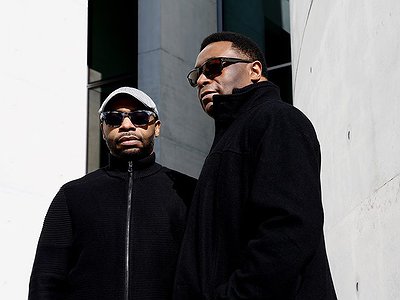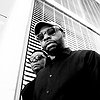Name: Octave One
Nationality: American
Occupation: Producers
Current Release: Endustry on 430 West
Recommendations: Diego Rivera - Detroit Industry mural
Barry White - Never Gonna Give You Up
Website / Contact: If you enjoyed this interview with Octave One, visit their personal website or facebook profile for current release news, music and background information.
When did you start writing/producing music - and what or who were your early passions and influences? What what is about music and/or sound that drew you to it?
We started writing and producing probably around 1988 or so, but honestly we’ve always made tracks even as kids in school playing instruments so our answer should be forever! But on the level in which we’re on now is 1988 and our influences truly outnumber the years in which we have been producing and writing music, so this question is really too numerous to answer. But we have a great love for early Old school RnB, Rock, Industrial and even some HipHop … our influences are endless!
We’ve always had a love of music as well, our mother was and is a true music lover, so loud music on any given day was always a part of our household coming up. It wasn’t us being drawn to it in fact it was a part of our upbringing.
For most artists, originality is first preceded by a phase of learning and, often, emulating others. What was this like for you? How would you describe your own development as an artist and the transition towards your own voice? What is the the relationship between copying, learning and your own creativity?
We really can’t say it was that way with us, because when we started primarily it was still somewhat in the infant stage of the techno movement. Shortly after the first generation of Detroit techno pioneers had paved the way into what it is now. The pattens for us weren’t so much set and followed but we created and developed by us, so our own voice began with our inception.
Although, we don’t knock anyone’s efforts for development we’re big fans of not copying someone else’s sound. For us, we just never saw it as being of, or any help to our scenes growth and development which we are really big on doing! No new thoughts, just about anything will make people cool off and lose interest after awhile, especially a specific genre of music. Trying to be creative copying someone else’s style is like walking behind someone’s footprints in the sand. You can’t really run and be free because you’re too busy trying to stick your foot into each and every step that they’ve made to get it right. What you're really doing is stifling your own creative juices and spirit in the process, your true voice is learning to be silent and follow - instead of aspiring to lead!
What were your main compositional- and production-challenges in the beginning and how have they changed over time?
Compositionally, no real challenges because in the beginning we were just creating for ourselves to release some pressures and to unwind and that presented no challenges of course. But, on the production side of things, we just didn’t have all of the equipment that we needed to sometimes create what we thought would be an interesting project. We went about borrowing pieces from our follow techno alumni which leads to you having some really amazing pieces from time to time but not truly understanding how to get the best out of what you borrowed. So, of course in time we just started purchasing our own and really learning that one piece from cover to cover until it wasn’t anything we couldn’t make that gear do … we’re talking about hardware of course.
What was your first studio like? How and for what reasons has your set-up evolved over the years and what are currently some of the most important pieces of gear for you?
First studio comprised of a very minimal equipment on tabletops and mostly the floors in the living room of Lenny’s first apartment. We couldn’t make a lot of noise during the evening because people were coming home from work. But we banged it out during the day for sure! Some fellow artist lived next door and they took up continuing the noise into and throughout the evening and on into the late night. Unfortunately, because Lenny lived next to the elevator everyone had to pass to get to there own, we often got major knocking on our door to ‘keep it down’! They thought it was us blasting the music during the late night hours so we caught the blame for that nightly … it’s funny thinking back on it now, but then it came to a few heated arguments with some other tenants who thought that they were being disrespected by the loud music.
Size and weight is probably the main reason for us making changes to the live show rig. And sometimes it’s just the fact that we wanna try something new for a minute. No main pieces, they’re all valuable to us and we can’t do without any of them … that’s why they’re traveling the world with us.
How do you make use of technology? In terms of the feedback mechanism between technology and creativity, what do humans excel at, what do machines excel at?
Technology is a tool, it’s a conduit for transferring human ideas to reality, to something tangible. Humans are the origin, where it all begins. It’s the spark that ignites the fire. Technology, as a tool, helps to sort through the idea, kindle the fire. Possibly making the tasks easier and faster to complete. Technology can also be the fuel that adds to the fire, adding things the originator may have not conceived. Humans make the final call, establishing when the task is complete. The final ear on what suits us.
Production tools, from instruments to complex software environments, contribute to the compositional process. How does this manifest itself in your work? Can you describe the co-authorship between yourself and your tools?
We have always worked with the bit of randomness that comes with machine or software. We welcome the unexpected in certain aspects of the creative process. Many times while attempting to do specific things, weird things occur. Notes play back incorrectly, sounds get distorted, patches behave badly. The mistakes sometimes are flashes of brilliance that can only happen because of the machine.
Collaborations can take on many forms. What role do they play in your approach and what are your preferred ways of engaging with other creatives through, for example, file sharing, jamming or just talking about ideas?
A lot of people don’t really realize how much we do collaborate, but it’s usually amongst our other brothers who are part of the writing portion of Octave One and aren’t with us on stage performing. That writing process might start in several different ways … sometimes sharing files that one of us has started, talking about a time period we enjoyed or just flat out jamming together … it’s all good and works for us!
Interviews / About
Fifteen Questions Interview with Octave One
It’s music, it moves us
Part 1

"Trying to be creative copying someone else’s style is like walking behind someone’s footprints in the sand. You can’t really run and be free because you’re too busy trying to stick your foot into each and every step that they’ve made."


